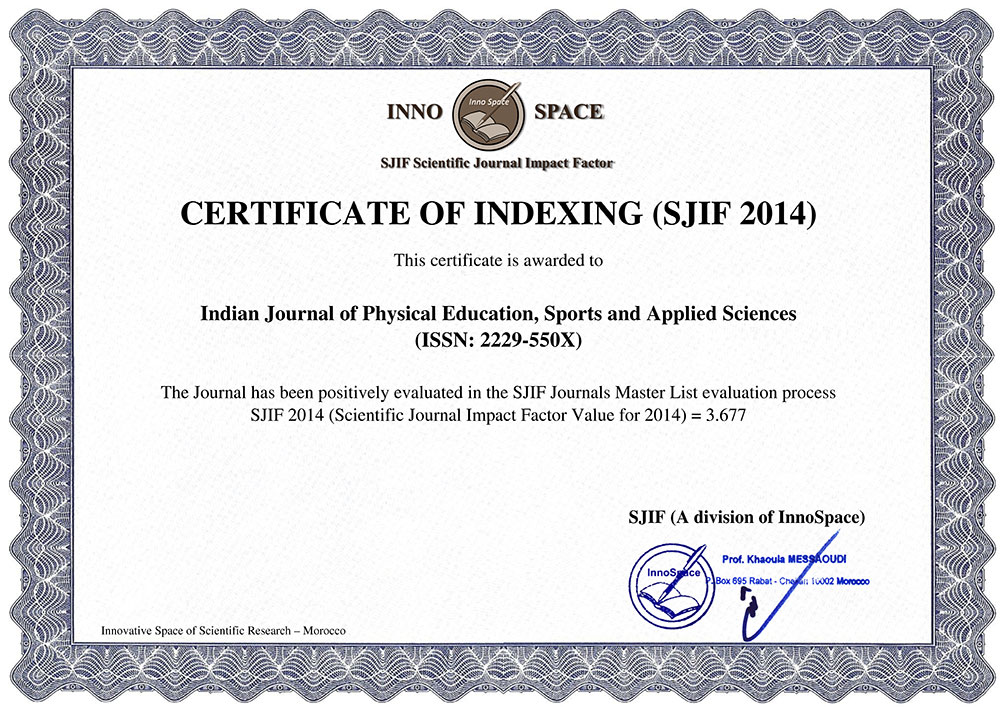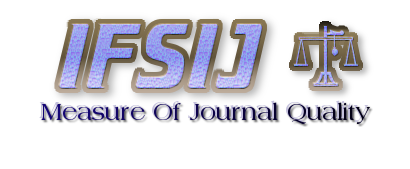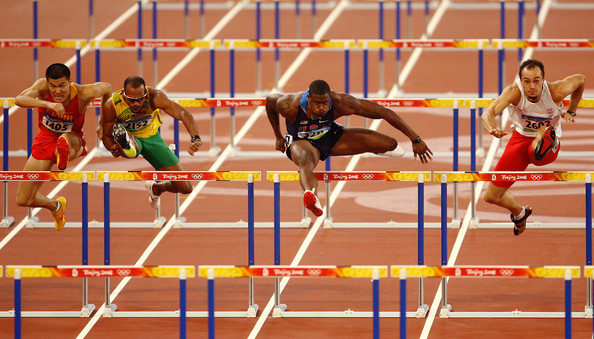ASSESSMENT OF PERCEIVED PURPOSE OF SPORT OF INTER-UNIVERSITY LEVEL MALE CRICKET PLAYERS
April, Volume 9-Number 2 May 9, 2019| Author name : | Dr. Ashish Kumar Nigam | ||||
|---|---|---|---|---|---|
| Page no : | 39-44 | Volume : | 9 | Issue : | 2 |
doi no.: 05-2016-44975451, DOI Link :: http://doi-ds.org/doilink/05.2019-13378534/
Dr. Ashish Kumar Nigam1
Affiliations
1 Sports Officer, Office of DSW, JNKVV, Jabalpur (M.P.) Mobile- 9826348748
ABSTRACT
The purpose ,of study was to assess and analyze the perceived purpose of sport among Inter-University level male cricket players. A purposive sample of three hundred and fifty inter-university level male cricket players representing there respective university teams in west zone cricket tournament held at Bhopal (M.P.), were selected as the subject of the study. Subjects perceived purpose of sports was assessed by a 46 item Purpose of Sport Questionnaire developed by Duda (1989). To determine the significance of difference among the scores on different sub factors of perceived purpose of sport of cricket players, mean, SD and Analysis of Variance were computed. He revealed that the inter-university level male cricket players gave more importance to physically active life style, function of sports participation and improvement in an individual’s co-operating skills and desire for personal mastery among the purpose of participation in cricket should be serve.
Keywords: Males, Cricketer, Perception, social status, cooperation, life style.
DOWNLOAD FULL TEXT: 
BIBLIOGRAPHY
Carpenter, Paul J. and Yates, Barry (1997), “Relationship Between Achievement Goals and the Perceived Purpose of Soccer for Semiprofessional and Amateur Players” Journal of Sport and Exercise Psychology 19 : 302-303.
Clarke, H. Harrison Clarke and Clarke, David H. (1972), Advanced Statistics With Application To Physical Education (Englewood Cliffs: Prentice Hall INC.
Duda, Joan L. (1989), Relationship, Between Task and Ego Orientation and the Perceived Purpose of Sports Among High School Athletes, Journal of Sport and Exercise Psychology 3: 318, 323.
Fern Andez-Rio, J., M éndez-Gim énez, A., Cecchini Estrada, J.A. (2014), A cluster analysis on students’ perceived motivational climate. Implications on psycho-social variables. Span. J. Psychol.,17 :E18.
Gonçalves, C.E., Coelho, M.J., Cruz, J., Torregrosa, M., Cumming, S. (2010), The effect of achievement goals on moral attitudes in young athletes. J. Sports Sci. Med. 9 : 605–611.
Jaakkola, T., Ntoumanis, N., Liukkonen, J. (2016), Motivational climate, goal orientation, perceived sport ability, and enjoyment within Finnish junior ice hockey players. Scand. J. Med. Sci. Sport, 26: 109–115.
Kamlesh, M.L. (1998), Psychology in Physical Education and Sports 2nd Revised Edition, New Delhi Metropolitan Publication.
Sheehan, Thomas J. (1971), An Introduction To The Evaluation Of Measurement Data In Physical Education (Massachusetts: Addison-Wesley Pub. INC., p.174.
Van den Berghe, L., Soenens, B., Vansteenkiste, M., Aelterman, N., Cardon, G., Tallir, I.B., Haerens, L. (2013), Observed need-supportive and need-thwarthing teaching behavior in physical education: Do teachers’ motivational orientations matter? Psychol. Sport Exerc. 14 :650–661.
Wang, J.C., Liu, W.C., Chatzisarantis, N.L., Lim, C.B.(2010), Influence of Perceived Motivational Climate on Achievement Goals in Physical Education: A Structural Equation Mixture Modeling Analysis. J. Sport Exerc. Psychol. 32 : 324–338.







